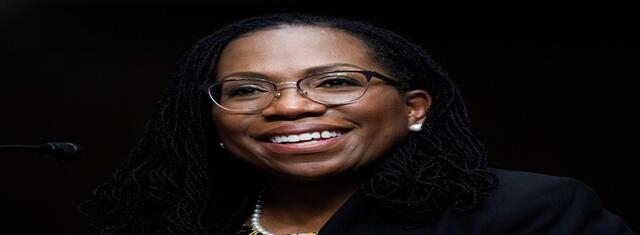News
Ketanji Brown Jackson's Supreme Court confirmation
Historic Event for the Court

Ketanji Brown Jackson (Source: Reuters)
USPA NEWS -
U.S. federal judge Ketanji Brown Jackson was confirmed as a Supreme Court justice on Thursday, making history as the first Black woman to reach the top court. Jackson was confirmed by a 53-47 vote in the Senate, with three Republicans joining all Democratic senators in voting in favor of her nomination.
Jackson once worked as a law clerk for Justice Stephen Breyer, whom she'll ultimately replace, after graduating from Harvard Law School. She worked as a public defender and served on the agency that helps develop federal sentencing policy, before being confirmed by the Senate as a federal district court judge in 2013, and last year as a federal appeals court judge. During the Supreme Court confirmation hearings, Democrats made use of a chart that shows Jackson stacks up favorably, in terms of experience, to recent justices.
"She is one of the most qualified nominees for the Supreme Court that I've ever considered in my 48 years here," said Sen. Pat Leahy, the longest-serving Democratic senator, from the chamber floor on Thursday. While conservatives in the Senate like Mitch McConnell have portrayed her as a nominee of the "radical left," retired federal judge Thomas Griffith, appointed by George W. Bush, said in testimony last month that Jackson was "an independent jurist who adjudicates based on the facts and the law, and not as a partisan."
Long gone are the days when Antonin Scalia could be confirmed by a 98-0 count (1986), or even 13 years ago, when Justice Sonia Sotomayor was confirmed by a comfortable margin of 68-31. The top court has immense sway over the contours of U.S. public policy, arguably more so now that Congress is frequently polarized and unable to come to bipartisan agreement on many important issues. Senators increasingly fear the electoral consequences of going "against" their party on a judicial nominee.
While not as explosive as confirmation hearings for Clarence Thomas (1991) and Brett Kavanaugh (2018), who were both accused of sexual misconduct, the Jackson hearings were plenty contentious. Republicans tried to portray Jackson as soft on crime, forensically examining the sentences she delivered in cases involving defendants who possessed child pornography. Democratic Sen. Cory Booker called the line of attack "beyond the pale," and his party accused Republicans of cherry-picking cases and not focusing on an overall record on sentencing in line with sentencing from even some Republican-nominated federal judges. In addition, Jackson's nomination had the backing of the National Fraternal Order of Police.
Jackson is just the third Black justice and sixth female justice overall. The overwhelming majority of the 116 justices in American history have been white men of European extraction, and largely Protestant in terms of religious affiliation. A recent Reuters report highlighted the incremental progress in recent years with respect to the percentage of U.S. law school grads who are non-white, but Black students are underrepresented in first-year law school classes compared to the African American share of the U.S. population.
She likely won't be sworn in until the summer, as Breyer will see out the current term ending in June. She'll have to decide very soon if she'll remain in her current federal post until then. There is no term limit on Supreme Court positions; Justice William O. Douglas served a record 36-plus years (until 1975). Jackson will not affect the balance of the court, as six justices were nominated by Republican presidents and three by Democrats.
Her first term is to begin on Oct. 3. The cases for that term so far include ones related to powers of the Environmental Protection Agency and Federal Trade Commission, voting rights and a case that will pit religious versus LGBTQ rights, after a web designer refused to provide his professional services to a gay couple. Jackson has said she intends to recuse from a case concerning Harvard's admissions process, as she sits on a university policy board there.
Justices only leave through retirement or death, a state of affairs seen as undesirable by many legal experts, some of whom have proposed having a floating number of justices to remove any partisan pressure justices might receive to give way for a younger person. Clarence Thomas, nearly 74, will be the oldest justice after Breyer retires.
Thank you for reading my article. These are merely my thoughts and insights based on the facts. I use only verified sources. No fake news here. I write about a variety of subjects, mainly things I want to research and know more about. You can check out my website – Small Village Life at smallvillagelife.com, where I share useful articles and news.
Wendy writes for the United States Press Agency and is a former columnist with the Fulton County Expositor, Wauseon, Ohio.
Source: Reuters
Wendy writes for the United States Press Agency and is a former columnist with the Fulton County Expositor, Wauseon, Ohio.
Source: Reuters
more information: https://smallvillagelife.com
Liability for this article lies with the author, who also holds the copyright. Editorial content from USPA may be quoted on other websites as long as the quote comprises no more than 5% of the entire text, is marked as such and the source is named (via hyperlink).





